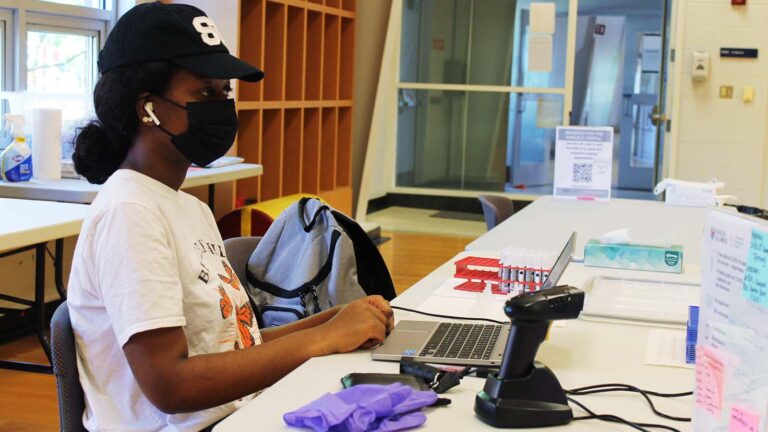CHAMPAIGN — This winter marks the last stage for one of the most impactful inventions at the University of Illinois in recent years – a saliva-based test for COVID-19.
Originally developed to keep the university operational during the pandemic, this test evolved into SHIELD T3, a company with global reach. At its most successful, SHIELD T3 employed over 170 people. But now, plans are in place to wind down operations by the end of this year.
Illinois Public Media spoke with Becky Smith, an epidemiology professor at UIUC, who was one of the first to work on the SHIELD team.
[Illinois Public Media]: It’s been two and a half years since the Food and Drug Administration authorized emergency use of the SHIELD saliva test. What do you see as the impact of the SHIELD test during that time?
[Becky Smith]: We needed testing as fast as we could, and we needed to get the results quickly. This was one of the first ways that we could do that before the antigen tests were developed. Before everybody could have the tests at home, this was the way that we were getting that done.
The fact that we could do it at scale, at universities across the state, in the schools, in a lot of businesses, that really helped Illinois get back on its feet and get going again, and in places outside of Illinois as well.
[Illinois Public Media]: You have done research specifically on how effective this was, modeling the trajectory at the University of Illinois versus other universities. Can you talk about that a little?
[Smith]: We have a paper, hopefully under review right now – it’s in submission, at least – to look at the comparison of how we use the test at Illinois versus how Purdue did. Purdue was using a test but not as frequently and not as much.
We definitely prevented more cases at Illinois simply because we had more testing going on. We were finding cases earlier and getting them isolated earlier. All of the research we’ve done has pointed to this test being really important for decreasing the number of cases and the amount of infection going on at UIUC.
[Illinois Public Media]: What did you learn from working with the test this whole time that would be helpful for the next public health crisis?
[Smith]: The number one thing that we learned is that as important as the test was, as game-changing as it was, you cannot tech your way out of a problem. A problem that has its origins in human communication and human interactions cannot be solved technologically.
We have to actually involve the social sciences, we have to think about human behavior, and we have to communicate better.
That’s not anything to do with the test, but it was really important. We had the best technological solution, I’d say, of any university in the country. We still had outbreaks, because of human behavior. Technological solutions are not enough.
[Illinois Public Media]: Can you talk a little bit about what that human behavior actually looked like and how you could potentially prevent it?
[Smith]: A lot of our problem on campus was that students wanted their college experience. And so [we needed to do] a little bit more thinking about how do we provide the college experience in a safer way. And we did start eventually doing that of messaging: Here’s how you can make some of these traditional college experiences, like parties and tailgating, safer.
[Illinois Public Media]: What’s next for the SHIELD team? What are you focusing on now?
[Smith]: Most of the SHIELD team is back to their own research. I was the only one working in infectious disease control before this, so I don’t get to see them very much. Most of them are back to their typical research, which is not in infectious diseases.
My team is still working on COVID a little, but it’s more analyzing data and making plans. There’s a group of us who are actually writing a book on how K-12 and public health worked together to understand and respond to COVID, as an example of how K-12 and public health can be partners in crisis mode.
[Illinois Public Media]: Are there any last words you’d like to say about SHIELD?
[Smith]: Even though SHIELD is shutting down, I do want people to know COVID is not over. We say COVID is now just like the flu. The flu is bad, COVID is pretty bad, and I just want people to be safe.
In the Midwest, and especially in Illinois, emergency room visits with COVID are on the uptick. We are heading into another spike right now.
So even with the news that we’re shutting down SHIELD and SHIELD Illinois, that doesn’t mean COVID is done. So please be aware. Get boostered, get your free tests, and take care of yourself.
Emily Hays is a reporter for Illinois Public Media. Follow her on Twitter@amihatt.

